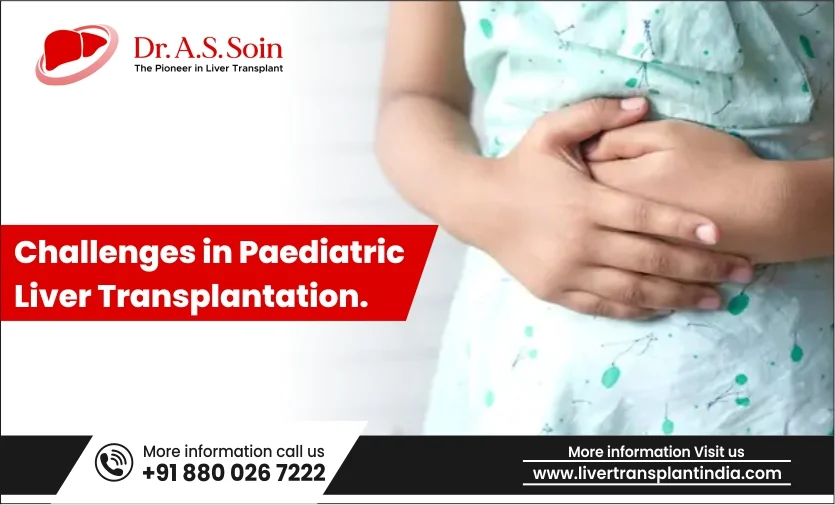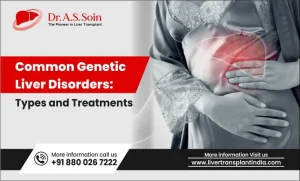Liver transplantation stands as a pivotal procedure, particularly critical for children grappling with severe liver ailments. Yet, the path to transplantation and beyond is fraught with formidable challenges, often daunting for families. At Liver Transplant India, we empathize deeply with these concerns, steadfast in our commitment to shepherd you through every facet of this transformative journey. This article delves into the manifold challenges encountered in pediatric liver transplant in India, offering insights to help comprehend the process and prepare for the road ahead.
Table of Contents
ToggleUnderstanding Liver Transplantation
A liver transplant involves substituting a diseased liver with a healthy one obtained from a donor. In children, this procedure becomes imperative when the liver’s functionality deteriorates due to various conditions.
Why Children Require Liver Transplants
Children may necessitate liver transplants due to:
- Biliary Atresia: Blockage or absence of bile ducts leading to liver damage.
- Metabolic Disorders: Genetic ailments affecting liver function.
- Acute Liver Failure: Sudden, severe impairment of liver function.
- Chronic Liver Diseases: Progressive conditions like cirrhosis.
Early detection of these conditions is paramount for timely intervention.
Pre-Transplant Challenges
The pre-transplant phase is pivotal, involving disease diagnosis, patient health assessment, and donor procurement.
Diagnosis and Referral
Identifying liver disease in children poses an initial challenge. Symptoms such as jaundice, abdominal swelling, and growth faltering can be subtle, often mimicking other illnesses. Timely and accurate diagnosis typically integrates blood tests, imaging, and liver biopsies. Once diagnosed, prompt referral to a specialized transplant center becomes crucial, as not all medical facilities possess the requisite pediatric transplant expertise.
Donor Procurement
Securing a suitable donor stands as one of the foremost hurdles. Donors may either be living or deceased:
- Living Donors: Often family members who donate a portion of their liver, affording advantages such as scheduled surgery and reduced wait times.
- Deceased Donors: Individuals who consented to organ donation posthumously. Waiting for a suitable deceased donor can be prolonged and uncertain. Matching donors and recipients involves ensuring compatibility in blood type and liver size, adding layers of complexity to the process.
Pre-Transplant Care
Managing a child’s health while awaiting a transplant presents another challenge. This phase may entail frequent hospital visits, symptom-managing medications, and meticulous attention to nutritional needs, delicately balancing to sustain optimal health until transplantation becomes feasible.
Pre-Existing Medical Conditions
Many children requiring liver transplants possess complex medical histories, including congenital anomalies or metabolic disorders. These conditions can complicate pre-surgical preparations and heighten risks of intraoperative and postoperative complications.
Immunization Status
Maintaining up-to-date vaccinations assumes critical importance in averting infections post-transplantation. Strategic planning is essential, as certain vaccines may necessitate careful timing to maximize efficacy and safety around the transplant procedure.
Financial Constraints
The substantial cost associated with pediatric liver transplantation in India, coupled with ancillary medical expenses, imposes a significant financial burden on families. Careful financial planning and securing adequate funding or insurance coverage are integral pre-transplant challenges.
Legal and Ethical Considerations
Navigating legal and ethical dimensions pertinent to transplantation—such as consent and organ allocation protocols—is imperative to ensuring a seamless and compliant transplant process.
Surgical Challenges
Performing liver transplants in children entails distinctive surgical complexities owing to their smaller size and developing anatomy.
Technical Precision
Conducting a pediatric liver transplant demands meticulous surgical expertise and precision. The intricacies are amplified by the diminutive operative field and fragile anatomical structures.
Vascular and Biliary Challenges
Pediatric cases pose heightened risks of vascular complications such as thrombosis or stenosis due to smaller blood vessels. Similarly, reconstructing delicate bile ducts presents challenges, predisposing to complications like leaks or strictures. Vigilant surgical technique and intensive postoperative monitoring are essential.
Anesthesia Risks
Administering anesthesia to children entails inherent risks necessitating specialized pediatric care. Anesthesiologists must adeptly manage potential complications, ensuring stable intraoperative conditions.
Graft Size Matching
Securing an appropriately sized liver graft for pediatric recipients remains a significant concern. Innovations like split liver transplants, dividing a single donor liver between two or more recipients, address size-matching challenges but introduce logistical and technical complexities, potentially heightening complication risks.
Postoperative Infections
Pediatric patients, owing to immature immune systems and requisite immunosuppressive therapies, face heightened susceptibility to infections. Diligent infection prevention strategies and vigilant monitoring are pivotal in averting graft compromise and associated morbidities.
Post-Surgical Care
Immediate post-transplant recovery marks a critical phase. Intensive monitoring in the Intensive Care Unit (ICU) is essential, mitigating risks of bleeding, infection, and organ rejection. This period mandates sophisticated medical oversight and unwavering vigilance.
Post-Transplant Challenges
Following a successful pediatric liver transplant in India, sustained management and surveillance are indispensable for long-term pediatric patient health.
Early Post-Transplant Period
The initial weeks post-transplantation pose heightened risks, including:
- Rejection: Potential immune system response against the new liver.
- Infections: Elevated susceptibility due to immunosuppressive therapy.
Extended hospitalization and intensive medical monitoring are often requisite during this phase.
Growth and Development
Liver transplantation can influence a child’s physical and cognitive development. Cumulative effects of chronic illness and rigorous treatments may impede developmental milestones, necessitating ongoing monitoring and supportive interventions to facilitate optimal growth and academic performance.
Nutritional Considerations
Maintaining optimal nutrition post-transplant is crucial yet challenging. Dietary restrictions, appetite fluctuations, and digestive issues may impact overall health and growth trajectory.
Chronic Graft Dysfunction
Over time, transplanted livers may manifest chronic dysfunction, necessitating vigilant monitoring and potential retransplantation interventions.
Long-term Follow-up
Even post-initial recovery, ongoing medical supervision remains imperative. Regular assessments are essential to gauge liver function, adjust medications, and promptly identify emerging complications, ensuring proactive management and comprehensive care.
Psychosocial Impacts
The ramifications of liver transplantation extend beyond physical health, profoundly impacting psychological and social dynamics for both children and families. Parental stress, childhood adjustment issues, and medication side effects underscore the importance of accessible support networks and therapeutic interventions.
Immunosuppression Management
Sustaining transplant viability mandates lifelong immunosuppressive therapy. Balancing therapeutic benefits with potential side effects—including infection susceptibility, hypertension, renal impairment, and weight fluctuations—demands judicious medication management and lifestyle adaptations.
Rejection and Complications
Despite advancements in immunosuppression, acute and chronic rejection persist as formidable risks. Timely detection and intervention for acute rejection are critical, whereas chronic rejection may necessitate re-evaluation for retransplantation. Concurrent risks encompass biliary complications, vascular thrombosis, and long-term liver deterioration.
Infections and Immunity
Immunosuppressive therapy heightens susceptibility to infections. Rigorous infection prevention strategies, encompassing vaccinations and vigilant hygiene protocols, are indispensable safeguards for pediatric transplant recipients.
Quality of Life Post-Transplant
Post-transplant life endeavors to optimize health outcomes, ensuring pediatric patients embrace a robust, fulfilling life.
Physical Well-being
While many children recuperate favorably, resuming normal activities post-transplant varies. Gradual reintegration into academics, physical pursuits, and routine medical evaluations constitute integral facets of recovery.
Emotional Health
Coping with chronic illness and surgical aftermaths can exact emotional tolls. Prioritizing mental health resources and fostering open familial communication buttress resilience amid transitional phases.
Long-term Prognosis
Long-term prognosis post-liver transplant is variable. Advances in medical care have markedly enhanced survival rates and life quality for pediatric recipients, underscoring continual optimism for improved outcomes.
Advancements and Future Prospects
Ongoing research and technological innovations promise to redefine pediatric liver transplantation paradigms, auguring brighter prospects ahead.
Surgical Innovations
Continuous refinement of surgical techniques—including minimally invasive modalities and enhanced imaging modalities—enhances procedural safety and efficacy, thereby optimizing recovery trajectories.
Pharmacological Advancements
Exploration into novel immunosuppressive agents aims to mitigate adverse effects, further augmenting long-term transplant viability and patient well-being.
Research Endeavors
Pioneering studies and clinical trials perpetuate transformative strides in pediatric liver transplantation, advocating for superior outcomes and minimized post-transplant complexities.
Conclusion
Pediatric liver transplantation in India epitomizes a multifaceted odyssey, offering renewed vitality to children confronting severe liver afflictions. Insight into challenges—from diagnosis and donor procurement to post-transplant care—empowers families to navigate this arduous expedition with resilience and fortitude. At Liver Transplant India, we stand steadfast in furnishing unwavering support and holistic care at every juncture.
For families embarking on this transformative journey, remember, you are not alone. Connect with us to access expert guidance, compassionate support, and optimal care for your child’s well-being.








